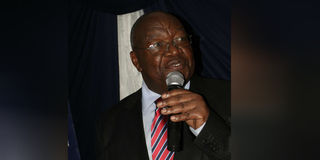Taban Lo Liyong: An elegy to my student and publisher Henry Chakava

Henry Chakava speaks at a function in Nairobi on October 19 2010. He died on March 8, 2024.
What you need to know:
- Rest in peace my student and publisher. One day I will come join you and hear my report about how things are going on in the land yonder.
- Veteran publisher Chakava will be buried March 23, 2024 in Vokoli, Vihiga County.
Once in the near past, a dear friend lost his father and I escorted him home. When we arrived, he asked me, “How would Homer mourn his father?” I was lost for words. “I do not know, I am not Greek and I have not gone through a book of world mournings,” I responded.
Seemingly, I also do not know how to mourn Henry Chakava.
Therefore, I shall mourn him not as the Kuku, my people, mourn. Nor as the Acholi, whose culture I know more of, do. I shall mourn him as a response to a tragedy that has struck a brother whom I have known since 1969, when he was one of my first students in English in Nairobi. His relationship with me grew to a point that on occasions, I would accompany him to go pick his fiancée, Rosalind, from Kenya Medical Training College, where she was training in nursing.
When I learnt that my friend Henry would be buried today, I cancelled my other plans and travelled from Juba to Nairobi and onto Vokoli village in Vihiga County to attend the funeral.
Henry, you were not only my student, but a scholar to be moulded into a modernist African. Like others of your generation from western Kenya, one would never know whether you were Kenyan, Ugandan, Tanzanian, or Rwandese.
When I came to teach literature in English at the Royal College Nairobi which is the modern-day University of Nairobi, Chakava, Eddah Gachukia, Christopher Wanjala and a few others let my first class in African Oral Literature (as well as others) shine.
These were the Second World War generation scholars. And they used to cross to Uganda’s Makerere University from Alliance High School, King’s College, Budo, Zanzibar and other schools across East Africa.
Why am l singing their praises so much? Because they excelled. I tried to lure Henry to go to Oxford but failed. At least I succeeded in sending him to Swansea. Had he applied to study Shakespeare, Oxford or Cambridge could have taken him. You do not go to study African literature in Oxford. They had no specialist in African literature, unless you brought your supervisor along. And for that you had better be Wole Soyinka.
A first class honours holder in BA, literature, Henry Chakava was lured by Professor Simeon Ominde to join Heinemann as an apprentice publisher. Meanwhile, Ngugi made use of me in Nairobi to fight his Kenyan colonialists’ suppression of Kenyans through English language and literature. We wanted African writings and literature if possible in African languages. Perhaps Ngugi was dreaming of creating a Russia-like nationalism so there would be one Kenyan major language for the whole nation, but with all the others using their languages in their areas.
But I digress. One day, Henry remarked that my English, in my books, was simple. That was the result of being taught to use school certificate-level English for middle-ended education and journalism English for newspapers. For journalists were coached to use simple language. And why I did well in teaching in Nairobi was because the level of understanding and using English in Kenya then was equal to that of American students. For, I had reached a higher personal level at Pongdwong (Sir Samuel Baker’s School) and added college proper English language and Literature at undergraduate course for a BA Major and Journalism for a minor.
So if the East African writers and readers found my writing difficult yet they had thought I had only reached East African level, they were right in complaining. When Henry could not appreciate my Christmas in Lodwar maybe it was because he had not covered French writing, nor New Zealand writer, the modernist Katherine Mansfield, one of the founders of modernism, nor Marcel Proust nor Virginia Woolf. Had Henry gone to Oxford, London, or California, perhaps he would have given modernism a room, or nudged Eastern African graduates with a varied background a chance to be edited in rather than kept out.
Yet as an editor, Henry – and Jonathan Kariara – gave their classic poets all the hearing they deserved. Jonathan, for instance, turned down some poems I sent him for Oxford University Press. But, whereas Jonathan’s standard was prohibitive, yours was uplifting.
Henry, in remembering you, the above thoughts flowed out of my heart on their own. That is how you affect me. It took one day to think, to conceive this eulogy. Then two days to write down, and perhaps two whole days to have it typed, glued down in my chair at home or in the office. I wish you were not dead. I would not have worsened my own health.
Rest in peace my student and publisher. One day I will come join you and hear my report about how things are going on in the land yonder.
Rest in peace.
- Prof Lo Liyong is a South Sudanese poet, academic and writer of fiction and literary criticism. He wrote, with Ngugi wa Thiong’o and Henry Owuor-Anyumba, ‘On the Abolition of the English Department’, which forever changed the teaching of literature at the University of Nairobi and, by extension, Kenya. His ‘Another Last Word’ and ‘Words that Melt A Mountain’ were published by East African Educational Publishers, of which Chakava was Founder and Chairman.




